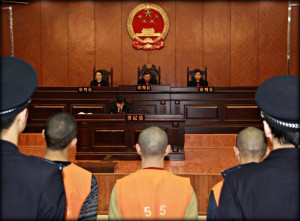
The long-winded and pretentious title would have been more accurate if instead of “China’s civil-rights lawyers,” it said “US-backed agitators.” Because that is precisely who the Economist is writing about, a deep and extensive network built upon millions upon millions of dollars of funding by the US State Department for so-called “nongovernmental organizations” across China, many headquartered or primarily backed by organizations in Hong Kong (NED support for: China, Hong Kong, Tibet, Xinjiang).
This network was in part exposed during Hong Kong’s so-called “Umbrella Revolution,” which failed spectacularly after the various US-backed NGOs leading it and their sponsors were exposed.
However, despite the dishonest means by which the Economist frames their article, the content itself if understood in the proper context is very informative. In fact, the content itself directly contradicts the title.
Weiquan, or Rights Protection
The Economist first defines “weiquan,” or rights protection, and explains that the most popular and successful “civil-rights lawyers” posed as working behind this principle. However, their primary example, Pu Zhiqiang along with several others, admittedly spent most of their time attacking the Chinese government, not defending the rights of anybody. The Economist would explain:
The evidence against Mr Pu includes tweets in which he ridicules Chinese propaganda, calls China’s ethnic policies “absurd” and appears to question the legitimacy of party rule. The charges are ironic: Mr Pu made his name defending the free-speech rights of journalists and writers. He can expect to spend several years in jail, a fate already being suffered by other prominent activists such as Xu Zhiyong, a moderate advocate for legal rights, who was sentenced last year to four years in prison for disrupting public order. Gao Zhisheng, a fierce critic of the party who took on politically sensitive clients, has been repeatedly abducted, tortured and imprisoned over the last several years. He was finally released from prison in August but little has been heard of him since.
Attacking the Chinese government or “defending” those who did, is a far cry from the principles of “weiquan” which include standing up against and exposing corruption, defending victims of land grabs and other exercises in the abuse of power. One is aimed at agitation, division and the undermining of sociopolitical stability, the other is aimed at strengthening it. And while many agitators may take on cases involving the latter, they do so only to legitimize their primary focus on the former.
Throughout the Economist’s article, examples of the Chinese government giving in on legitimate grievances is noted as part of the success of many of these agitators who attached themselves to these legitimate causes. Many of these causes were already being fought for long before US-funded and backed agitators showed up, and only to help fuel their other more nefarious activities. The Economist would note:
In the end, however, the lawyers fell victim to their own success. The party became suspicious of their networks, and their rapid deployment at scenes of confrontation with officialdom, such as protests by residents enraged at the bulldozing of their houses by government-backed developers. In 2006 Luo Gan, then China’s security chief, urged that “forceful measures” be used against saboteurs of the system who operate “under the guise of weiquan”. That is when the men on the cover of Asia Weekly, already by then under intense official scrutiny, became China’s most wanted. President Xi is now finishing the job of locking them away.
China’s security chief himself in his statement regarding America’s stable of agitators accuses them of hiding behind “weiquan,” indicating that “weiquan” or rights protection in and of itself is not what Beijing has taken issue with. Beijing realizes the importance of stemming the abuse of its people’s rights by wanton corruption and abuse of power. If left unchecked, regardless of Beijing’s philosophical or ideological beliefs, such abuse will inevitably lead to instability, and more so with foreign-funded networks specifically seeking to create such conditions.
China Targets Agitators By Separating Legitimate/Illegitimate Opposition
In the end, the Economist’s article is about China shutting down networks of agitators posing as “right protectors,” not because Beijing believes protecting the rights of its people is unimportant, but specifically because of the damage to real rights advocates Washington’s networks are causing and the inevitable instability it will lead to.
When protesters bring to Beijing a specific grievance and seek a specific solution, even the Economist appears to admit Beijing is willing to consider such cases. However, when opposition brings legitimate grievances, but instead of a specific solution only seeks to undermine Beijing, the book is thrown at them.
Still, in the minds of many well-intentioned individuals, they cannot differentiate between legitimate protests and foreign-funded sedition and agitation. The network the Economist mentions is backed, referenced, their organizations and affiliates funded and supported by the US State Department, its National Endowment for Democracy and the immense networks of parallel NGOs and government agencies both in the US and in Europe that serve as their willing accomplices not only in China but all around the world.
Beijing’s best bet is to continue improving its responses to legitimate grievances and truly seeking to improve the lives of the people living under its rule, while differentiating and exposing the game agitators play. Separating agitators clearly from the many legitimate causes they use to camouflage themselves with is an essential step to channeling social tension from the streets in the form of protests, and into other directions where the actual source of the tensions can be practically dealt with.
The Economist admits these “civil-rights lawyers” have been bested, but in doing so, they admit the US’ formidable network of global agitators no longer has free reign in China.
Ulson Gunnar, a New York-based geopolitical analyst and writer especially for the online magazine “New Eastern Outlook”.
